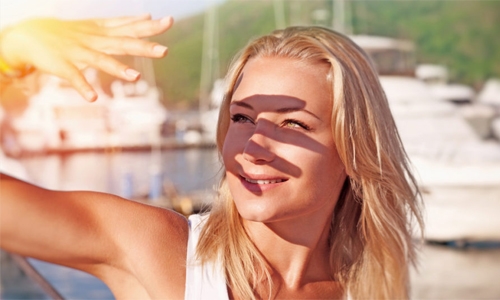Give good care to your eyes this summer
Summer is here in full force and the rising temperatures bring with it a plethora of eye problems like itchiness, burning and dry eyes. Although many people look forward to the summer holidays, one must be careful about the eye problems the season brings with it. Watch out for excessive sunlight, pollen from flowers, chlorine in swimming pools, contaminated water, dust, and pollution. While these problems are usually short-lived, they can be uncomfortable and can disrupt your routine.
Here are a few simple acts of self-care and precaution that can help you avoid these problems, and have a pleasant summer. Allergies are by far the most common summer eye problem and are usually secondary to pollen, dust, wind and air pollutants. They can vary from mild itching and redness of the eyes to severe watering and swelling of eyelids. The dryness of eyes caused by the extreme heat also leads to an increased frequency of eye infections like styes, bacterial and viral conjunctivitis. Styes are commonly caused by frequent rubbing of eyes with unwashed hands and eye strain caused by reading or working on computers for long hours.
Conjunctivitis is also very common in summer, and its symptoms include redness of eyes, a pricking sensation, discharge, and watery eyes. When this happens, immediately visit an eye specialist. Wash your hands frequently with soap and water. Maintain good eye hygiene with repeated eye washing with clean water. Don’t share handkerchiefs or towels and avoid handshaking. In case you wear contact lenses, discontinue contact lens wear immediately till the infection has been cured. Antibiotic eye drops and eye ointments work well for this ailment. Summer is also the time of dealing with a lot of excessively strong sunlight.
Just as we use sunscreen to keep the sun’s UV rays from harming our skin, UV treatment in eyeglass lenses blocks those same rays from damaging our eyes. When stepping outdoors, always wear shades that have complete UV protection. Sunglasses should block out 99 to 100 percent of both UVA and UVB radiation and screen out 75 to 90 percent of visible light. Check to make sure your sunglass lenses are perfectly matched in colour and are free of distortion and imperfection. Grey-coloured lenses reduce light intensity without altering the colour of objects, providing the most natural colour vision.
During summer time, most pools will increase the amount of chlorine or other chemicals to keep the water safe. This, however, leads to irritable eyes. When swimming, make it a point to wear goggles with adequate sealing and as a rule wash your eyes with fresh water the moment you get out of the pool after every swimming session. However, if you have been swimming wearing your contact lenses and without goggles, the eyes can get itchy or worse, there could be redness, which could be a sign of eye infection.
If that happens, then you should see a doctor immediately without delay and get treated accordingly. And most importantly, avoid self-treatment. Dry eye is a condition where the tear film of the eye is inadequate in quantity or quality, thereby resulting in an unstable tear film which breaks frequently giving rise to dry spots on the cornea of the eye. This can cause irritation, redness, soreness, dry feeling, gritty sensation and paradoxically reflex watering. These symptoms can get worse because of exposure to dry cold air from air conditioners, hot wind and reduced blinking are seen while working on computers, watching TV or prolonged reading.
Stay away from dusty areas. Avoid rubbing eyes whenever you feel itchy; this protects your eyes from getting puffy and swollen. Instead, keep your eyes well-hydrated by consciously blinking at regular intervals and replace lost moisture to your eyes by dipping them in cool water at regular intervals. This relaxes stressed eyes and keeps them hydrated, especially if you are constantly on your mobile and laptops. You may not realise it but sitting in an air-conditioned room all day long and staring at electronic screens leads to a decrease in the rate at which your eyes blink, causing dryness due to rapid evaporation of tears from the eyes.
This is even more, especially if you wear contact lenses. Other eye protection tips include using eye drops. Lubricating drops are ideal this time of the year. Ideally, the drops should be preservative free if you plan to use them over your contact lenses. These drops help keep the contact lenses well hydrated and the eye comfortable and quiet. Examination by an eye surgeon can help to rule out other underlying treatable causes of dry eye such as thyroid disorder, which can cause dryness in eyes, especially in women with this problem.
Related Posts

